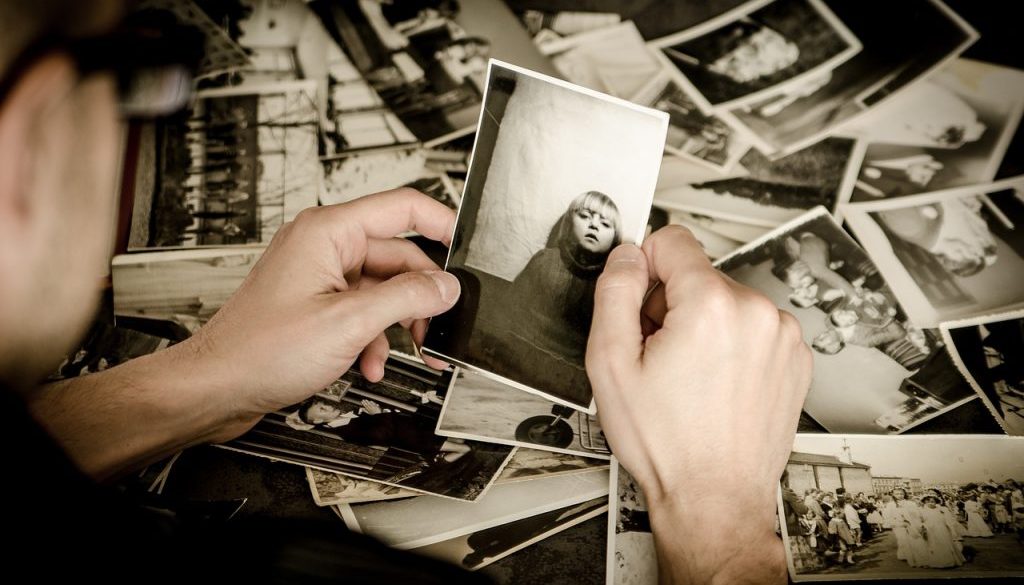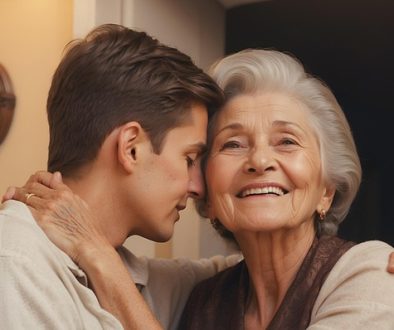Photographs & Memories: Memory Care for Dementia Using Pictures
A photograph is a memory captured. It can be printed, kept in digital form, hung on a wall, shown off, gifted, and enjoyed immediately and repeatedly. You can see how important pictures are in memory care for dementia. They capture memories to be used when your loved one’s brain gradually loses the ability to retain those memories.
An elderly woman late in nursing care gazes longingly at an old photo of a strapping young man showing off his new ’68 Mustang, recalling falling in love and raising children together many decades ago. She doesn’t fully recognize the gray-haired man sitting next to her, lovingly stroking her hand, as the man from the photo. But she knows that feeling. She’s comfortable. She’s happy.
A man with early-onset Alzheimer’s enjoys walking down the hallway, greeted by family portraits and candid’s of his kids and grandkids at play. He loves them dearly. And those photos may be all he has left to remember life with them as his dementia progresses.
Like an old picture, memories crack and fade with time. The details may become more fuzzy and obscure. But just having them helps. They help along the path toward a life worth living with dementia. Let’s examine more about how photographs may improve memory care for dementia.
Memory Care for Dementia Using Photographs
As time goes on, even the healthiest brains slowly forget the details of our memories. When someone we love has dementia, this happens so much faster for them – and in ways and orders no one can predict. Surrounding your loved one with photographs of their favorite people and memories can help them hold on a bit longer.
My life partner/care partner Brian takes TONS of photos along our journey together with his Alzheimer’s and vascular dementia. He’s quite a skilled photographer – often snapping breathtaking pics of the dolphins, birds and other marine life outside our house on Tampa Bay. He often says he’ll enjoy these long after the dementia has entered late stages – even if he can’t recall taking them.
The Neuroscience Behind Photographs and Dementia Care
I’m no neuroscientist, but as a life-care planner and Board-certified patient advocate in Florida, I’ve known and worked with thousands of persons living with dementia – beyond Brian. I’ve seen first-hand how photographs can play a huge role in making our loved ones with living with dementia feel connected and engaged with the world.
Looking at pictures stimulates the brain. We think about what’s and who’s in the photo. We try to recall. We try to connect the dots and see where the photo fits into life’s narrative. Our neurons fire – sometimes after being long dormant. Much like art and music for dementia, this helps greatly in improving memory and prolonging strong cognitive functions.
Photos also can decrease depression and isolation that unfortunately comes with dementia. The loved one can see themselves in a happy memory surrounded by loved ones. Continually looking at photos can also help with recalling who the people around them are.
So how can you use photographs in improving memory care for dementia?
Create a Photo Album
Creating a photo album can be a great way to make a timeline of your loved one’s life so they can “relive” it through memories. Chronological order works wonderfully. You can begin when they were born, if possible, and take them through their younger years through adulthood, raising families, and all the way up to today.
Label the Pictures
In your loved one’s bedroom, you can hang up photographs of everyone they love, and you can add their names and titles for depth. This helps them put a name to the person’s face and to stimulate memories of love and life shared together. You can also add in how the person relates to your loved one, such as “daughter,” “neighbor,” “best friend” or “husband.”
A PLWD may not recognize a face or an event. Perhaps they won’t remember where the photo was taken. They will, however, know how the memory makes them feel now. Even if they can express the feeling, they are feeling it.
Continue to Update Photos in Real Time
You can continue to add to the album as they grow older and progress through the disease. That’s the one thing about photographs: you can always have more, and their sentimental value only grows stronger.
Never stop taking photographs because you can build on the most recent years for your loved one living with dementia. As is often the case, memories may regress in reverse-chronological order. So they may not easily remember a grandchild’s recent birth or their latest trip to the ballgame. But the ever-present reminder of a photograph may jog the memory and help to keep a grasp on reality, if only for a little longer.
Discuss the Photos Often
Each photograph has a story. Each story is a talking point – a chance to engage, to think, to reconnect. Talk about who these people are, the subject of each, and how they are meaningful to your loved one’s existence.
Connect photos with experiences and feelings. They may not remember the moment, but they may easily recall the feeling. They may remember how they felt during that first dance, the smell of the perfume or the taste of the meal. Even if they no longer communicate verbally, simply bringing a smile to their face may be the best medicine.
Conversation Starters
They’re also great conversation starters for other friends and family members. When people come to visit a PLWD, they often don’t know what to talk about. If you take a box and place several photos separately in ziplock bags with a description of what the photo is about, visitors can pick a photo or photos to have conversations around. What a great way to break the ice
Using Photographs & Other Sensory Aids in Memory Care for Dementia
Photographs and other sensory aids can be the spark that holds some memories together. Find unique ways to incorporate photos into your loved one’s life. It’s the perfect way to compassionately honor their legacy and who they are today. (And they’re something you can hold onto forever, even after they’re gone.)
Let’s include all this in a life-care plan that promotes memory care for dementia and ensures a life worth living for your loved one and the entire care-partner team! Feel free to contact me any time at maureen@caregiversupportandresources.com, or download your free e-magazine below.






